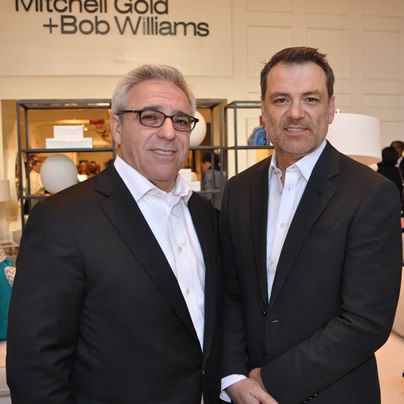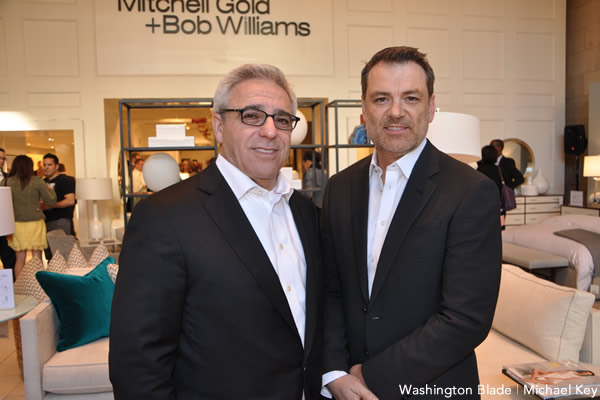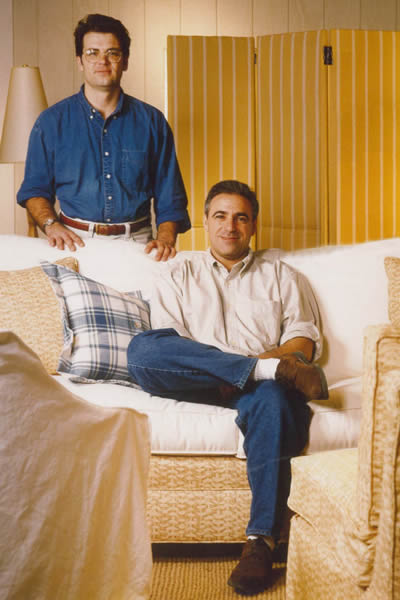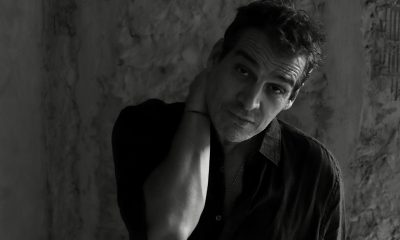Arts & Entertainment
Celebrating silver in style
Gay-owned furniture company Mitchell Gold + Bob Williams marks milestone


Mitchell Gold (left) and business partner Bob Williams at their Washington store for an event in 2013. (Washington Blade file photo by
Mitchell Gold + Bob Williams
25th anniversary event
A benefit for Sitar Arts Center
Wednesday
6-9 p.m.
Mitchell Gold + Bob Williams Washington location
1526 14th St., N.W.
mgbwhome.com
RSVP requested
202-332-3433
Mitchell Gold and Bob Williams, co-owners of the eponymous furniture company, didn’t originally intend for their company to be as big as it is today.
Gold says they were originally thinking of a modest business model in which they’d work four days a week, have a small stable of customers and do about $5 million a year in sales.
“We didn’t have to make that much money,” Gold says. “It was just the two of us living down South, it’s much less expensive to live here, and we thought we would just have this nice little company. … But as Bob often tells people, ‘It’s not that Mitchell lied — it’s just that he can’t count.’”
Started in 1989 with about $60,000, things took off rather quickly. They sold about 800 dining tables and 5,000 chairs before they started making any of the pieces. Gold, who’d been fired from the furniture company he’d worked for, had connections with major retailers like J.C. Penney, Crate & Barrel and others, which he visited armed with sketches and fabrics Williams had made. They were profitable the first year they were in business.
“We had fabrics that were different and unusual for the time,” Gold says. “So we were able to show retailers, ‘This is how this will look in your store.’ And they bought it right away. People have said I’m not a bad salesman, so I was able to close the sales and get the production going quickly.”
The two, who’d been together as domestic partners about two years before, had moved to Hickory, N.C., from New York and were interested in going into business together.
“We just thought we could do it better than traditional manufacturers,” Gold says. “We thought we could make a better commitment to customers, ship it more quickly and with Bob’s sense of style, you know, I certainly felt we could offer people a more stylish look for a better price.”
Williams worked for a small ad agency and gradually cut back his time there as he spent more and more with the company, then known as the Mitchell Gold Company (it was changed to its present name in 2002).
Now they’re celebrating 25 years and have more than 700 employees, a stable of celebrity clients, 17 stores and plans to open four more by year’s end and a 600,000-square-foot factory and home base in Taylorsville, N.C.
Several spoke at a company event two weeks ago where 11 of their original 21 employees who are still with the company were recognized. It appears, from a transcript of comments, that morale there is strong.
Ken Hipp, the company’s senior vice president of retail stores and merchandising, has been with them for seven years and calls Gold and Williams “wonderful mentors.”
“It’s been quite a ride,” says Hipp, who’s also gay. “I can’t imagine my career or my life without them.”
Known for a style they call “quintessentially American,” their products are designed to be stylish, yet comfortable. Interior designer Brian Patrick Flynn of TBS’s “Movie & a Makeover” show has called their products “custom-looking pieces at medium-to-high price-points” and says it’s a “genius brand” he and his clients “can’t get enough of.”
On Wednesday, the two will be in town for an event at their D.C. store at 1526 14th St., N.W., an anniversary event that will benefit the Sitar Arts Center. It’s one of a series of events they’re having at their various locations throughout the year.
In a country where just 25 percent of new employer firms are still in business 15 years or more after starting according to the Small Business Administration, theirs is a nearly unfettered success story.
It hasn’t all been easy going, though. Williams remembers many long hours in the early years, though he also says those were some of the most “exhilarating times of my life.”
They recall years of working what felt like round-the-clock schedules and didn’t take a vacation until two years into it, but were gratified by strong out-of-the-gate sales.
“Customers liked what we were doing immediately,” Williams says. “We never had to go call on people. The more they heard about us, the more we had people wanting to buy from us.”
They broke up on the personal side about 12 years into the business, though they’re wholly comfortable working together and are each married and have been with other men for years — Gold has been with Tim Gold for seven years; Williams has been with Stephen Heavner for 11 years.
Might their relationship have lasted if it weren’t for the company? It’s a thorny question they don’t wish to dwell on.
“We don’t give much thought to it,” Williams says.
“It takes a lot of time and energy to go back and visit the past,” Gold says. “We’re more focused on the future.”
They acknowledge there were “a few little awkward moments, but not too much,” as Gold says. Keeping the company strong was chief among their priorities as always, they say.
The only time they had any significant downsizing was in 2008. Gold says it was a hard, but at the time necessary, decision in the face of a huge recession.
The company prides itself on the health care package it offers, on-site day care and cafeteria and unabashed LGBT advocacy work.
They say providing such amenities pays off in the long run.
“I think what we have proven is that you can be profitable and do the right thing,” he says. “When you have people who aren’t sick, they’re being more productive and that makes things more profitable. With our day care, if little junior has a problem, somebody goes and takes care of it and is back in 15 or 20 minutes, not the three hours it would take to go across town.”
They guess about 15 percent of their employees are also LGBT and estimate between 15-20 percent of their clientele is as well. Gold says it’s “certainly higher than other furniture retailers.”
Gold, who wrote a book called “Crisis: 40 Stories Revealing the Personal, Social and Religious Pain and Trauma of Growing up Gay in America” in 2008, says being open about such things is a central component to the company.
He relishes telling of a celebration dinner they had with loan officers after paying back a $25 million loan they’d used to expand. Several of the bank execs told him how reading “Crisis” had given them new compassion for LGBT issues, from one man who stepped up his giving at a homeless shelter to another whose wife came out.
“One by one, they went around the table and told us how much our advocacy work had meant to them,” Gold says.
Coming from a staid banking environment, Hipp says finding a place he could be out on the job was a revelation.
“I thought I loved banking but I realized banking did not love me,” he says. “I was very uncomfortable and very conflicted over my future and I was met with some very harsh realities. I could not believe that someone of my age, I was in my early 20s at the time, could actually go to work someplace where it was OK for me to be who I was. I didn’t have to tuck any part of myself under my sleeve. I could actually say that I was gay and it didn’t matter. … I was just a kid from the south and I thought that was the best it would get.”
Some of the 25th anniversary events will benefit LGBT and AIDS causes. Gold next plans an open letter to the Pope urging him to change Vatican teaching that homosexuality is sinful behavior.
“When you get down to it, that’s really the seminal reason why people think gay people should not have equality,” Gold says. “The whole issue of sin is really the crux of why people are against it.”
But has there been backlash or lost sales along the way?
“Our business just keeps going at such a pace that’s ahead of the industry with sales and growth and things like that,” he says. “You know, we can’t worry about the one or two people who aren’t going to buy from us because we’re gay and outspoken.”
Mitchell Gold and Bob Williams on:

Bob Williams (left) and Mitchell Gold in the early years of their business. (Photo courtesy of Mitchell Gold + Bob Williams)
• Their all-time favorite products:
GOLD: Leather club chairs they designed after spotting vintage pieces at a Paris flea market.
“If something sells that well and looks pretty, I sure do like it,” he says.
WILLIAMS: “Our slipcovers are great because they’re just so versatile — you can dress them up or down, change the style and they just give off this great ambience of relaxed, casual comfort.”
• How practical the whites and neutrals they use so often are for everyday
GOLD: “Today’s fabrics are a lot different from what you saw 20-30 years ago. They’re much friendlier to live with and stain resistant.” And if you spill red wine? “In a lot of the fabrics, yes, it will come out. But you have to get it quickly, not let it sit there a day.”
• Nate Berkus
GOLD: “We love Nate Berkus.”
WILLIAMS: “He has great hair.”
GOLD: “Yes, he has great hair, he’s cute and adorable and we’re fairly friendly with him. I like his work a lot.”
WILLIAMS: “His last book was great.”
• Thom Filicia (of “Queer Eye” fame)
GOLD: “Sweet guy and talented. We were at a design kind of home in South Hampton and his room was really a standout.”
• 2013 sales?
GOLD: “Over $100 million.”
• Lulu, the company mascot
GOLD: “She’s resting in peace. She was 12 and a half and she will be the mascot in perpetuity. The thing about bulldogs is once they decide on something, that’s it. They figure out a way to get it. She came to work with us everyday and loved walking around and saying hi to everyone.”
Photos
PHOTOS: Sydney Gay and Lesbian Mardi Gras Parade
48th annual LGBTQ event held in Australian city

The 48th annual Sydney Gay and Lesbian Mardi Gras Parade was held on Feb. 28.
(Photos by Cori Mitchell)




















a&e features
35 years after ‘Truth or Dare,’ Slam is still dancing
Salim Gauwloos on Madonna, HIV, and why he almost didn’t audition for Blond Ambition Tour

Most gay men of a certain age remember “the kiss.”
It was the moment Madonna’s dancers Salim Gauwloos and Gabriel Trupin locked lips in the hit 1991 documentary film “Truth or Dare,” which is celebrating its 35th anniversary this spring.
The kiss was hot, but what made it groundbreaking is that it appeared in a mainstream Hollywood movie that screened in suburban multiplexes across the country. This wasn’t an obscure art house film. The movie, and tour on which it was based, received months of breathless media attention all over the world for bold expressions of female empowerment and queer visibility. Madonna was threatened with arrest in Toronto for simulating masturbation on stage and Pope John Paul II urged Catholics to boycott the show, triggering a media firestorm.
“Truth or Dare” was billed as a behind-the-scenes documentary of the tour, but it quickly became clear that the real star of the show wasn’t Madonna, but rather her colorful troupe of seven backup dancers, six of whom identified as gay: Kevin Stea, Carlton Wilborn, Luis Xtravaganza Camacho, Jose Gutierez Xtravaganza, Gauwloos, and Trupin; Oliver Crumes III identifies as straight.
We saw them party and march in the New York City Pride parade. They were unabashedly queer at a dangerous time — before protease inhibitors began to stem the AIDS plague and before most celebrities and politicians embraced the gay community in any real way. Being out in 1991 carried major risks to career and reputation.
Enter Gauwloos, one of those brave dancers who vogued his way into the hearts of countless gay men entranced by his handsome looks, his stage presence, and dance skills.
Gauwloos — known then and now as “Slam”— sat down with the Blade to talk Madonna, the lasting impact of “Truth or Dare,” the public disclosure of his HIV status, and plans for a new book on his life.
His story is fascinating — from growing up in Europe to dancing in New York to landing the gig of a lifetime with Madonna. He performed on that tour while secretly HIV positive and went without medical treatment for 10 years because he was living in the United States as an undocumented immigrant. Not even Madonna knew of his HIV status. Two other dancers on the tour were also HIV positive but no one talked about it. Ironically, Madonna was singing “Express Yourself” and advocating for condom use during her concerts yet backstage three of her dancers were secretly positive.
“A lot of people were dying so I wasn’t going to tell Madonna I had HIV,” said Slam, now 57. “And the others didn’t either. It wasn’t the moment to do it. She used to make speeches about Keith Haring and AIDS and I thought it’s going to be me next.”
Gabriel Trupin died of AIDS in 1995. Slam was diagnosed at age 18 in 1987, a frightening time when a positive test result often meant a death sentence. He booked the “Blond Ambition Tour” at age 21 after moving to New York. His friends encouraged him to audition but Slam resisted because he wasn’t a big Madonna fan.
“It was crazy, everyone wanted that job,” he said, “but I wanted to dance with Janet Jackson and Paula Abdul.” He listened to his friends and shortly after the audition, Slam received a call from Madonna herself inviting him to join the tour.
“We all wanted to be stars but not even Madonna knew how big that tour would become. The way it was choreographed and directed, the stars aligned. … It never looks dated even today.”

The world tour kicked off in Japan in April 1990 then moved to the United States and Europe, stirring controversy wherever it went. There was the iconic cone bra; the aforementioned simulated masturbation during “Like a Virgin”; and religious imagery that offended many Catholic groups and the Vatican.
And the controversy didn’t end with the tour. Cameras were rolling throughout the tour for what Slam thought would be a “video memory” for Madonna. But as the tour unfolded, director Alek Keshishian reportedly became more interested in what was happening behind the scenes so plans for mere tour footage were expanded into a full documentary.
“We were young and partying and didn’t really know what was going on,” Slam said. “You live in this celebrity bubble and you sign a paper – I don’t even know what I signed.”
In 1992, Kevin, Oliver, and Gabriel sued Madonna for invasion of privacy and fraud claiming she used some footage without their consent. They claim they were told nothing would be included in the film that they didn’t want to be seen. In one specific incident, Gabriel alleged that he told producers he didn’t want the scene of him kissing Slam to be in the film as he wasn’t fully out.
“Gabriel was forcibly outed,” in the movie, Kevin said in a 2016 interview.
Slam did not join his colleagues in the lawsuit.
“I couldn’t sue because I was illegal but I wasn’t ever going to sue,” Slam said. “I’m not a suing kind of person. But good for them, they fought for it and won. A lot of people don’t have the balls to sue Madonna.” The suit was settled two years later for an undisclosed sum.
“We were all conflicted about the kiss,” he said with a laugh. “The kiss, oh my God, my boyfriend is going to kill me! Belgian stress!”
Beyond worrying about his boyfriend’s reaction, Slam had concerns about the impact of being openly gay on his modeling career.
“In 1990, you couldn’t get high fashion campaigns as an openly gay model,” he said. “I was worried about that. I couldn’t get a campaign because I was gay. My agency told me to say I was straight and it was just a game.”
In 2016, pegged to the 25th anniversary of “Truth or Dare,” the surviving six dancers filmed a documentary about their lives post-Madonna titled “Strike A Pose.” In it, Slam publicly revealed his HIV status for the first time in an emotional scene with his former colleagues.
“I found the strength to tell the world I have HIV,” he recalls. “I was scared but I felt brave. The outcome and messages were beautiful. After I saw ‘Strike A Pose,’ I knew we gave people hope. And not just for gay people.”
He was infected in 1987 but didn’t get treated until 1997. After the tour ended, he said he went into a depression and his agency dropped him.
“I was partying too much after the tour,” he recalls. “I made a decision to live as an illegal alien.” In 1997, Slam collapsed and was rushed to the hospital with pneumonia.
“They started treating me and thank God the new HIV drugs were out, the cocktails, it took me a couple months to get better.”
Madonna didn’t participate in “Strike A Pose” and Slam said he hasn’t seen or spoken to her since the end of the tour. He said he had no idea of the impact “Truth or Dare” would have.
“You look at this movie in 1991 and you don’t think it’s going to be such a big thing and 35 years later it’s still helping people,” he said. “It was helpful for people who felt alone at that time. It was such an important documentary.
“I don’t think younger gay people realize how important Madonna was to gay and queer visibility — she was a big part of it. We showed the world it’s OK to be gay and that was the great message of this movie.”
He noted that, decades later, many of his friends have transgender kids and that queer culture is represented in much of mainstream pop culture.
“It’s amazing how far we’ve come,” he said. “I know we’ll always be marginalized but we have come so far. I’m really proud of our community. The current nightmare will be over and I do believe that things will get better.”
Referencing President Trump’s attacks on the LGBTQ community and crackdown on immigration, Slam described the situation in the U.S. today as “sad.”
“Everything is such a mess,” he said. “Some of these people have lived here 30-40 years and they take you out of your home. I can’t even imagine. It breaks my heart. When I was illegal it was a different story.”
Slam met his husband, Facundo Gabba, who’s from Argentina, in 2000, and he helped him get a legal case together to win citizenship. He filed a case in 2001 and was told there was a 99 percent chance he wouldn’t be permitted to stay in the United States because they weren’t allowing HIV-positive immigrants to remain in the country. But he got his green card anyway in 2005 and became a U.S. citizen in 2012.
Today, Slam and Gabba live in Brooklyn, though they travel a lot because “I can’t take the cold.” The couple married in Argentina in 2010 and in the U.S. in 2016.
Slam is still dancing and working as a choreographer. He’s teaching at a contemporary dance festival in Vienna in July and even offers online lessons via Salimdans.com.
As a longtime HIV survivor, Slam is dedicated to a healthful lifestyle.
“You have to keep moving; when you move you stay healthy,” he says. “Dance heals everything. I do yoga, I eat healthy and clean as possible. I don’t watch much TV … I try to stay healthy and positive. If I absorb all of the negativity I would be sick.”

In addition to his ongoing work in dance and choreography, Slam is in the early stages of writing a book about his extraordinary life and pioneering career.
“I always knew I had a book inside of me. I want to talk about my HIV status. I know I can inspire more people. I want to tell even more secrets in the book; secrets are a poison so I want to tell everything.”
Among those secrets, he notes, is a desire to write about his strict Muslim father and the years he spent as an undocumented immigrant in America.
“Those are the things I want to talk about, the struggles. It’s a love story, hope and resilience. I know it will help people.”
As for his friends from the tour, Slam says he remains in contact with Gabriel’s mother and José Xtravaganza is his best friend. Baltimore’s Center Stage theater is currently developing a new musical about Xtravaganza’s life. And Slam said he occasionally talks to Oliver, though “he still can’t pronounce Sandra Bernhard’s name.”
At the end of our interview, Slam indulged a round a rapid fire questions:
• Favorite song to perform in the “Blond Ambition” tour? “Express Yourself.”
• Aside from Madonna, who was your favorite artist you worked with? Toni Braxton in “Aida” on Broadway.
• Favorite Madonna song? “Live to Tell”
• Favorite Madonna video? “Bedtime Stories”
• What’s more stressful: performing in a concert or performing on the VMAs? “Both, because we always had to be perfect.”
• Did you go to Madonna’s recent “Celebration” tour? “I didn’t see the show but I saw clips online.”
• What do you remember most about performing “Vogue” at the VMAs? “It was nerve-racking for them to flip those fans.”
• When was the last time you vogued? “I teach classes so a couple weeks ago.”
Books
Love or fear flying you’ll devour ‘Why Fly’
New book chronicles a lifetime obsession with aircraft

‘Why Fly’
By Caroline Paul
c. 2026, Bloomsbury
$27.99/256 pages
Tray table folded up.
Check. Your seat is in the upright position, the airflow above your head is just the way you like it, and you’re ready to go. The flight crew is making final preparations. The lights are off and the plane is backing up. All you need now is “Why Fly” by Caroline Paul, and buckle up.

When she was very young, Paul was “obsessed” with tales of adventure, devouring accounts written by men of their derring-do. The only female adventure-seeker she knew about then was Amelia Earhart; later, she learned of other adventuresome women, including aviatrix Bessie Coleman, and Paul was transfixed.
Time passed; Paul grew up to create a life of adventure all her own.
Then, the year her marriage started to fracture, she switched her obsession from general exploits to flight.
Specifically, Paul loves experimental aircraft, some of which, like her “trike,” can be made from a kit at home. Others, like Woodstock, her beloved yellow gyrocopter, are major purchases that operate under different FAA rules. All flying has rules, she says, even if it seems like it should be as freewheeling as the birds it mimics.
She loves the pre-flight checklist, which is pure anticipation as well as a series of safety measures; if only a relationship had the same ritual. Paul loves her hangar, as a place of comfort and for flight in all senses of the word. She enjoys thinking about historic tales of flying, going back before the Wright Brothers, and including a man who went aloft on a lawn chair via helium-filled weather balloons.
The mere idea that she can fly any time is like a gift to Paul.
She knows a lot of people are terrified of flying, but it’s near totally safe: generally, there’s a one in almost 14 million chance of perishing in a commercial airline disaster – although, to Paul’s embarrassment and her dismay, it’s possible that both the smallest planes and the grandest loves might crash.
If you’re a fan of flying, you know what to do here. If you fear it, pry your fingernails off the armrests, take a deep breath, and head to the shelves. “Why Fly” might help you change your mind.
It’s not just that author Caroline Paul enjoys being airborne, and she tells you. It’s not that she’s honest in her explanations of being in love and being aloft. It’s the meditative aura you’ll get as you’re reading this book that makes it so appealing, despite the sometimes technical information that may flummox you between the Zen-ness. It’s not overwhelming; it mixes well with the history Paul includes, biographies, the science, heartbreak, and exciting tales of adventure and risk, but it’s there. Readers and romantics who love the outdoors, can’t resist a good mountain, and crave activity won’t mind it, though, not at all.
If you own a plane – or want to – you’ll want this book, too. It’s a great waiting-at-the-airport tale, or a tuck-in-your-suitcase-for-later read. Find “Why Fly” and you’ll see that it’s an upright kind of book.
The Blade may receive commissions from qualifying purchases made via this post.



















